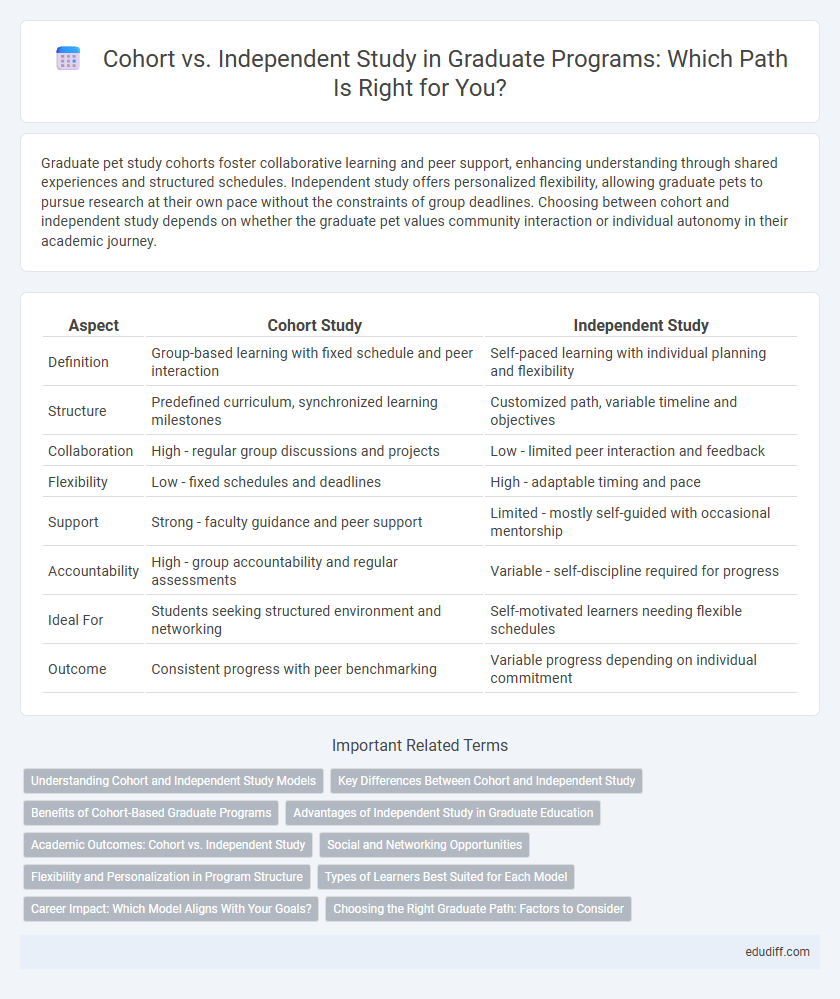Graduate pet study cohorts foster collaborative learning and peer support, enhancing understanding through shared experiences and structured schedules. Independent study offers personalized flexibility, allowing graduate pets to pursue research at their own pace without the constraints of group deadlines. Choosing between cohort and independent study depends on whether the graduate pet values community interaction or individual autonomy in their academic journey.
Table of Comparison
| Aspect | Cohort Study | Independent Study |
|---|---|---|
| Definition | Group-based learning with fixed schedule and peer interaction | Self-paced learning with individual planning and flexibility |
| Structure | Predefined curriculum, synchronized learning milestones | Customized path, variable timeline and objectives |
| Collaboration | High - regular group discussions and projects | Low - limited peer interaction and feedback |
| Flexibility | Low - fixed schedules and deadlines | High - adaptable timing and pace |
| Support | Strong - faculty guidance and peer support | Limited - mostly self-guided with occasional mentorship |
| Accountability | High - group accountability and regular assessments | Variable - self-discipline required for progress |
| Ideal For | Students seeking structured environment and networking | Self-motivated learners needing flexible schedules |
| Outcome | Consistent progress with peer benchmarking | Variable progress depending on individual commitment |
Understanding Cohort and Independent Study Models
The cohort model organizes graduate students into a structured group progressing through a program together, fostering collaboration, peer support, and consistent academic pacing. Independent study allows students to pursue personalized research or coursework tailored to individual interests, providing flexibility and self-directed learning. Understanding these models helps graduate students choose the approach that best suits their learning style and career goals.
Key Differences Between Cohort and Independent Study
Cohort study programs emphasize collaborative learning, where students progress through courses as a group, fostering peer interaction and structured schedules. Independent study offers flexibility, allowing graduate students to tailor their research focus and pace without fixed group deadlines. Key differences include the level of social engagement, curriculum rigidity, and individualized control over learning paths.
Benefits of Cohort-Based Graduate Programs
Cohort-based graduate programs foster collaborative learning environments that enhance networking opportunities and peer support, leading to higher student engagement and retention rates. Structured schedules and collective progress promote discipline and accountability, resulting in improved academic performance and timely program completion. Exposure to diverse perspectives within a cohort develops critical thinking and interpersonal skills essential for professional growth.
Advantages of Independent Study in Graduate Education
Independent study in graduate education offers personalized learning tailored to individual research interests, fostering deeper mastery of specialized topics. It enhances critical thinking and problem-solving skills by allowing students to engage directly with primary sources and advanced methodologies. Flexibility in scheduling and pacing promotes effective time management, enabling graduate students to balance academic responsibilities with professional or personal commitments.
Academic Outcomes: Cohort vs. Independent Study
Graduate students in cohort programs experience structured peer collaboration and shared deadlines that enhance academic outcomes through consistent feedback and motivation. Independent study fosters self-paced learning, allowing tailored research depth but may pose challenges in maintaining accountability and timely progress. Studies indicate cohort models often yield higher completion rates and improved critical thinking skills compared to independent study formats.
Social and Networking Opportunities
Cohort-based graduate programs foster strong social connections and professional networks by enabling students to collaborate closely with peers throughout their studies. Independent study offers limited structured interaction, often resulting in fewer opportunities for meaningful networking and social engagement. Building relationships within a cohort can significantly enhance career prospects through shared experiences and access to alumni networks.
Flexibility and Personalization in Program Structure
Cohort programs offer structured timelines and fixed curriculum paths, fostering collaboration and consistent peer support, which suits graduates who prefer guided learning. Independent study allows greater flexibility, enabling students to tailor coursework and pacing to their individual interests and professional goals. This personalized approach benefits self-motivated learners seeking customized academic experiences within graduate studies.
Types of Learners Best Suited for Each Model
Cohort-based graduate programs suit collaborative learners who thrive in structured environments with peer interaction and collective discussions. Independent study appeals to self-motivated learners who excel in autonomous settings, managing their own schedules and pursuing personalized research interests. Understanding these learner profiles helps graduate students select the model that maximizes their academic success and engagement.
Career Impact: Which Model Aligns With Your Goals?
Cohort-based graduate programs foster collaboration, networking, and peer support, enhancing career opportunities through group projects and shared learning experiences. Independent study offers personalized flexibility, allowing students to tailor research and skill development to specific professional goals, which can be advantageous for niche careers. Choosing between cohort and independent study depends on whether you value structured peer interaction or customized focus for career advancement.
Choosing the Right Graduate Path: Factors to Consider
Choosing the right graduate path involves evaluating the learning style and support system offered by cohort programs versus independent study. Cohort programs provide structured schedules, peer collaboration, and networking opportunities, which can enhance motivation and professional growth. Independent study allows for greater flexibility and self-paced learning, ideal for those balancing work or personal commitments while pursuing advanced degrees.
Cohort vs Independent Study Infographic

 edudiff.com
edudiff.com